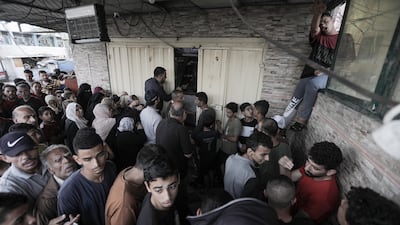Live updates: Follow the latest news on Israel-Gaza
Fayez Aqeela, 60, from Gaza city, has been out since 5am on Monday searching for bread and is yet to find food to feed his 18-member family.
“We try to feed our kids with noodles and small bites of food just to fill them up, but we are running out of supplies.
“I don’t know what to do,” Mr Aqeela told The National.
His story is typical of the plight of hundreds of Gazans struggling to find water, bread and medical supplies to survive Israeli bombardment.
Gazans fear venturing out for food supplies as Israel has increased its daytime strikes, civilians said.
“Israel usually increases its strikes during the night, but the last two days there has been air strikes targeting homes in broad day light,” a resident from Gaza told The National.
More than two weeks into the war on Gaza, which was triggered by a surprise Hamas attack on Israel on October 7, has exacerbated a humanitarian crisis.
More than 5,000 Palestinians, mainly civilians consisting of women and children, have been killed across the Gaza Strip in Israeli bombardments.
Supplies are running low across all fronts in Gaza and aid groups told The National the situation is “nothing short of devastating, desperate”.
Ahmed Hassan, 77, has seven children and is unable to find water, not even salty water “in the bathroom to wash”, he told The National.
Civilians in Gaza endured one of the bloodiest nights on Sunday, since the war with Israel began with more than 400 people killed in attacks by Israeli warplanes.
“We cannot describe how terrible the situation is,” he said.
Civilians are getting more desperate by the hour looking for shelter, food and water. Their plight has hardened following the intense campaign of air strikes.
Gaza resident
“I walked over two kilometres carrying empty gallons of water, we have been going back and forth but we can’t find anything, not even bread,” he said with an exhausted voice.
“Where do we go?” Mr Hassan said.
The UN refugee agency for Palestinians, UNRWA, has been forced to ration potable water, providing only one litre of water per person per day, according to the UN Office for the Co-ordination of Humanitarian Affairs
The minimum international sphere standard is 20 litres per person in emergency situations.
The situation in Gaza is “nothing short of devastating, desperate, even these adjectives do not do justice” to the current humanitarian crisis Gazans are going through, said Jessica Moussan, the Middle East media adviser for the International Committee of the Red Cross (ICRC).
“People have very little food and water left for them and their families. They are sleeping in the open with no safe haven, uncertain about their future,” Ms Moussan told The National.
“Hospitals are working tirelessly and under terrifying conditions, running out of supplies to care for the injured,” she added.
Shop owners are running low on flour, sugar, salt, pasta, lentils, and suppliers cannot go and buy for safety reasons.
Shop owner
“We are going day by day and have no idea what is to come except that our supplies are running out,” shop owner Abu Mohammed Shamaly, 30, said.
“We are rationing our supplies so they don't run out quickly but the essentials are all gone,” he said.
Wassim Abdul Amer told The National, that his food supplies will only last for another three days.
“We only have beans left.
“We only have supplies for another three days, I haven’t raised my prices and even if I do find a supplier it’s going to be very expensive to get new stock,” Mr Abdul Amer said as he sells vegetables to queues of customers.
“We are selling 30 per cent more than what we have been selling on a normal day before the war started. We don’t have any chickpeas, we only have beans left,” he said.


